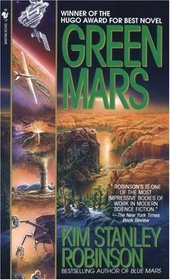Helpful Score: 2
While I am a fan of Kim Robinson's work, I found it difficult getting into these novels, even after I'd found out that James Cameron had optioned them for the film rights. Still and all, Green Mars is a cut above the usual mass market fiction, but be warned, it's really involved. Part 3 of his "Mars Trilogy".
Helpful Score: 1
Kim Stanley Robinson has earned a reputation as the master of Mars fiction, writing books that are scientific, sociological and, best yet, fantastic. Green Mars continues the story of humans settling the planet in a process called "terraforming." In Red Mars, the initial work in the trilogy, the first 100 scientists chosen to explore the planet disintegrated in disagreement--in part because of pressures from forces on Earth. Some of the scientists formed a loose network underground. Green Mars, which won the 1994 Hugo Award, follows the development of the underground and the problems endemic to forming a new society.
Helpful Score: 1
A wonderful sequel to "Red Mars," this book tells the story of the second generation in Robinson's Martian world. Terraforming is continuing, of course, but the ongoing political (and sometimes physical) struggle between competing interests both within the Martian community and back on Earth is what really makes this story shine. Robinson continues to use his rich web of characters and well-researched scientific plot elements to great effect here. I can't wait to pick up "Blue Mars!"
Very good book about the terraforming and political growth of Mars.
Excellent near-future sci-fi, with enough science to make it interesting, and well developed plot that holds it together.
This was a continuation of Red Mars. It is long and drawn out, but still he goes into the characters very well. It is best to read them in sequence. I was fascinated by how they colonized Mars and about the First One Hundred.
Story is very good, and character interactions are well-written, but I think this book, as well as Red Mars and especially Blue Mars need serious editing. Descriptive passages and "travelogue" sections are far too long for my taste.
The second volume of the Mars Trilogy. The trilogy is a novelization of the colonization of Mars 2050-2150 AD. It focuses on the issues of initial colony project, the terraforming of the Mars ecosystem to be human habitable and the relations between the Mars Colony and Earth. This book is about the internal conflict between the Red Mars faction -- keep it as it was and the Green Mars faction -- make it earth like.
Second in the Mars trilogy. Won the 1994 Hugo Award for best novel.
Second in the Mars series. Nearly a generation has passed since the first pioneers landed but the transformation of Mars to an earthlike planet has just begun.
This book begins when nearly a generation's passed since the first pioneers on Mars landed and began making it habitable. The people are divided- stick to the plan and make the planet Earthlike, or leave it a barren beauty.
This book is about the terraforming of Mars...it's the second book in the series which begins with Red and ends with Blue.
I loved the whole series. This is book 2, describing the conflict over terraforming Mars.
This sequel to the stunning 'Red Mars' shifts away from the fundamental questions asked there, and into more philosophical and societal questions: Now that we live on Mars, what tenets will we use to build our society? How can we improve on the systems we came from?
In many ways, I found this the better novel of the two. The grandeur and excitement of the first book is gone, but the characters are shown navigating complex new territory in wholly believable ways.
In many ways, I found this the better novel of the two. The grandeur and excitement of the first book is gone, but the characters are shown navigating complex new territory in wholly believable ways.




